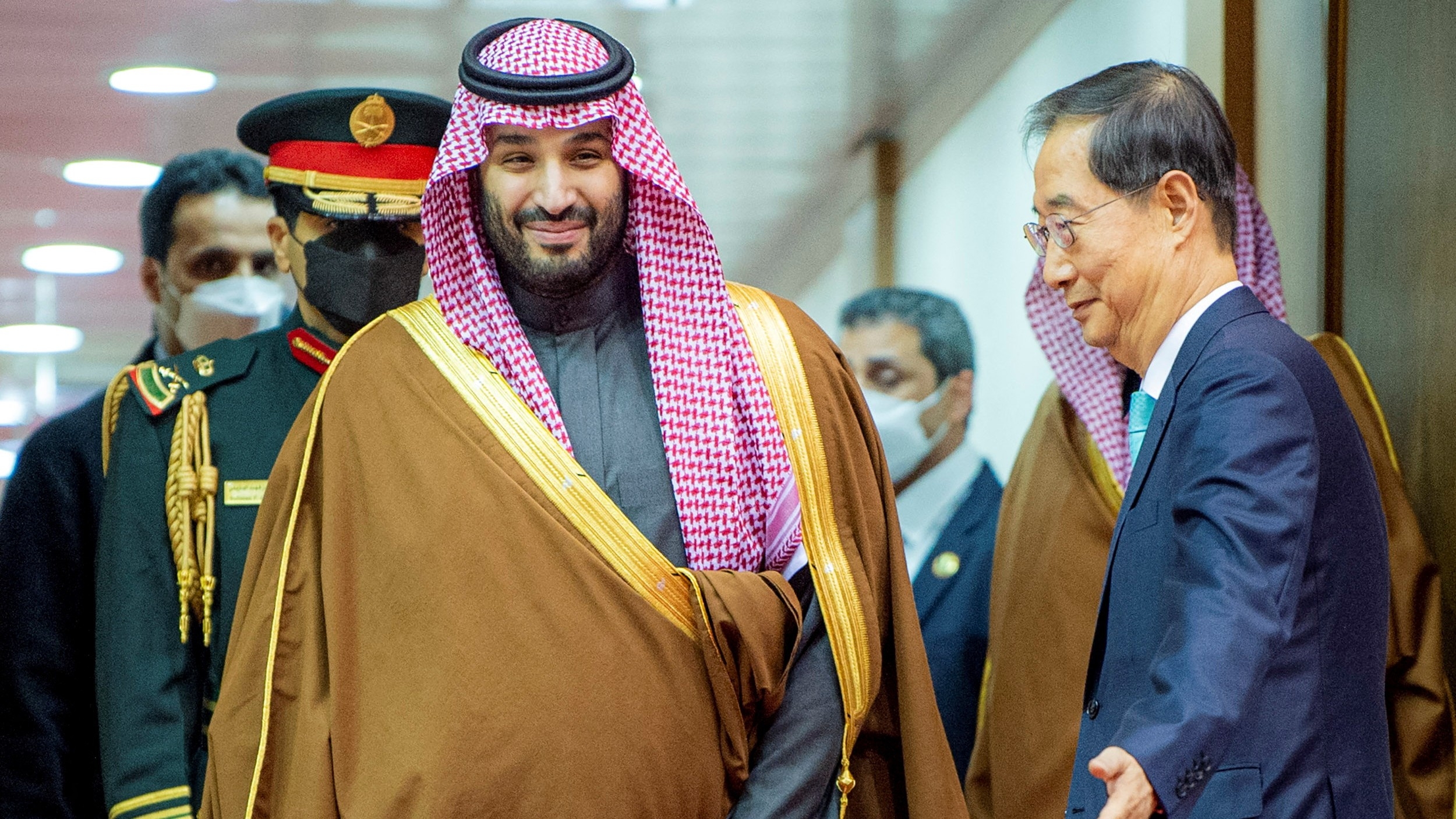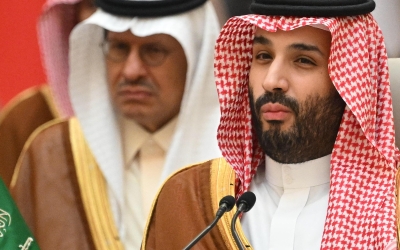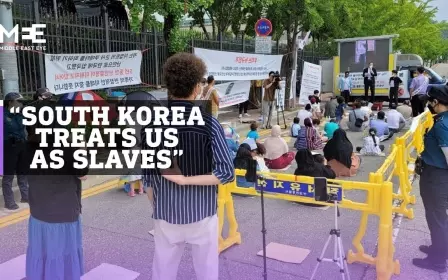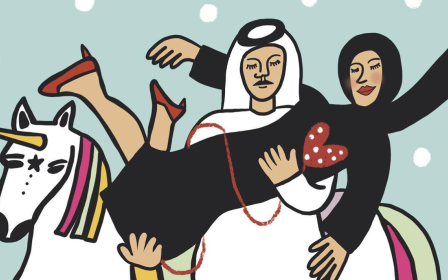Saudi Arabia and South Korea 'drastically' deepen ties after crown prince visit

Saudi Arabia signed new multi-billion dollar deals with South Korea last week, in the kingdom's latest bid to boost ties with one of its main oil consumers and the fourth largest economy in Asia.
In his visit to Seoul on 16 November, Saudi Crown Prince and Prime Minister Mohammed bin Salman met with South Korean President Yoon Suk-Yeol and a number of heads of Korean conglomerates such as Samsung and Hyundai.
The headlines of major South Korean news outlets showcased the scale of the agreements signed between the two sides, with some claiming that the crown prince's visit could lead South Korea into an economic boom through contracts to megaprojects, such as Neom, a $500bn new desert city in Saudi Arabia.
'Saudi forces kill children, innocent women and the elderly. They bomb weddings and school buses. We have become refugees because of him'
- Shebami, Yemeni refugee in South Korea
During the visit, which lasted less than 24 hours, the two sides signed 26 investment agreements, reportedly worth 100 trillion won ($75bn), according to the Seoul Economic Daily.
But the visit was condemned by Yemeni refugees in South Korea who saw it as an indicator of a double standard, as their country continues to suffer a protracted conflict led by Saudi Arabia.
New MEE newsletter: Jerusalem Dispatch
Sign up to get the latest insights and analysis on Israel-Palestine, alongside Turkey Unpacked and other MEE newsletters
Shebami, a Yemeni refugee in South Korea, said he was disappointed to see Mohammed bin Salman hosted by South Korea last week.
"This murderer, who the South Korean government invited, is plundering resources in Yemen and destroying the country," Shebami told MEE. "Saudi forces kill children, innocent women, and the elderly. They bomb weddings and school buses."
The Saudi-led air strikes in Yemen and its blockade have contributed to the "world's worst humanitarian crisis", according to the World Food Programme.
While the last seven years of war in Yemen have witnessed over 370,000 deaths, South Korean arms sales and its expanding partnership with the kingdom raise serious questions over its position on human rights issues.
"We have become refugees because of him. Hosting [Mohammed] bin Salman for the sake of economic benefits is a betrayal to humanitarian principles and demonstrates the peak of South Korea's double standards."
'Drastic' bolstering of relations
The memorandums of understanding signed on 17 November included a construction project of a railway system in Neom, joint development of green hydrogen, and ammonia production.
In his meeting with South Korean President Yoon Suk-Yeol, Mohammed bin Salman said he hoped to "drastically bolster" bilateral cooperation in the sectors of energy, defence, infrastructure and construction, according to the South Korean presidential office.
'What matters for Seoul in its foreign policy is its security and economic benefits'
- Hwang Yuihyun, Seoul National University
The huge investment deals signed between the two countries come as no surprise.
Since Mohammed bin Salman's rise to power in 2015, when he was named crown prince and defence minister, Saudi-Korean relations have witnessed notable diversification of cooperation, expanding from traditional sectors of oil trade and construction to alternative energy development, entertainment and the weapons industry.
South Korea has been eagerly seeking to participate in the construction of Saudi Arabia's first-ever nuclear power plant, and was among four countries, including France, China and Russia, to bid for the $10bn nuclear project.
Meanwhile, Seoul and Riyadh have bolstered ties in the weapons industry, even as the Gulf country has been increasingly condemned for the devastating humanitarian toll of its seven-year war in Yemen.
In a press conference earlier this week, Minister of Land, Infrastructure and Transport Won Hee-Ryong said the Saudi crown prince showed "strong will in weapons industry cooperation" with South Korea during the summit with President Yoon Suk-Yeol, according to Yeonhap News Agency.
He added that Yoon proposed joint weapons development and production in Saudi Arabia.
Korean-made arms sales to Saudi Arabia are nothing new. Saudi Arabia signed weapons import contracts with Korean defence companies in March worth $989m, according to Korea JoongAng Daily.
The temporary US weapons export ban earlier this year - followed by sanctions on importing Russian weapons after the invasion of Ukraine - made South Korea a more attractive weapons seller to the Saudis.
Korean anti-tank missiles and air defence systems have already been deployed in the war against Yemen.
Hwang Yuihyun, a research fellow at Seoul National University's Asia Centre, argued that South Korea's behaviour echoes that of its Western allies.
"US President Joe Biden directed his harsh criticism on the human rights situation in Saudi Arabia during his election campaign," he told Middle East Eye.
"However, with the rise in oil prices after his term began, Biden flew to Saudi Arabia to meet [Mohammed] bin Salman."
According to Ui-Hyun, just as Biden's attitude is seen as a move to elicit cooperation from the Saudis to stabilise energy prices, "South Korea is no different".
"What matters for Seoul in its foreign policy is its security and economic benefits."
Bin Salman's 'reforms'
The new multi-dimensional development in bilateral relations between South Korea and Saudi Arabia falls within the context of the crown prince's reform plans under his Saudi Vision 2030, a long-term diversification strategy.
Since becoming crown prince, Mohammed bin Salman has presented himself as the "reformer", by diversifying the oil-based economy and implementing reforms that include opening up the entertainment industry and lifting certain social restrictions.
Mohammed bin Salman is also seeking to bolster his support among the youth, as 70 percent of the population in his country is under 30. Developing the entertainment industry is one way of reaching this goal and South Korea has risen to become its major partner in this new project.
In 2019, K-Pop group BTS was the first non-Arab performer to hit the stage of King Fahd International Stadium with an audience of 60,000.
The founder of SM Entertainment, the largest entertainment enterprise in South Korea, Soo-man Lee was in Riyadh in March. He met with Princess Haifa Bint Mohammed Al Saud, the deputy minister of tourism, to discuss exporting the South Korean idol training system to develop 'S-Pop', according to the Korea Economic Daily.
Soo-man Lee is also the sole Asian advisor to the kingdom's new development plan of Qiddiya, an entertainment resort city worth $82.1bn of investment.
Middle East Eye delivers independent and unrivalled coverage and analysis of the Middle East, North Africa and beyond. To learn more about republishing this content and the associated fees, please fill out this form. More about MEE can be found here.





